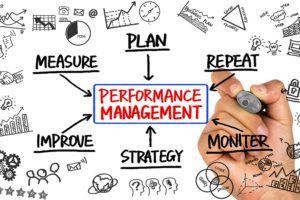Share
Like coaches in sports and leaders in the military, your company’s managers can drive the whole company to success or failure. Even with highly experienced managers, stereotypes like Bill Lumbergh in “Office Space” exist for a reason.
More than ⅓ of employees have considered quitting their jobs because of new, inexperienced managers (source: Bloomberg)
Employees know when their managers are effective or working against them. You can’t have an effective and motivated team as long as your leaders and coaches are ineffective. Experienced workers can describe countless things they’ve disliked about past managers, but how do you separate legitimate concerns from grudges or simple complaining?
Learn more about manager effectiveness and how to measure it accurately.
What is manager effectiveness?
Manager effectiveness focuses on the measurable impact of different management styles. Managers need to motivate subordinates to achieve, but that shouldn’t mean creating a stressful or overbearing culture. Managers may need to better manage low performers to avoid high turnover and eroding cohesion.
Effective managers should work to unlock the potential of individual workers. How reliable is their judgment in setting clear and achievable goals? The most popular managers aren’t necessarily motivating high performance. Use measurable variables to track and compare managers.
Why your organization needs effective managers
Your company can’t succeed without effective managers. They not only oversee, but also motivate and inspire their teams and departments. Managers ensure that workers understand and follow company policies, and they bring timely problem-solving attention to issues developing on the ground. Effective managers help their subordinates become more productive, engaged, and successful.
6 manager effectiveness metrics to measure
Several metrics combine together to reflect manager effectiveness. You shouldn’t depend too much on a single indicator. High turnover might be normal after hiring seasonal workers or responding to a particular crisis. Track and compare multiple variables to identify which managers need more attention.
Employee engagement scores
Use employee engagement surveys and productivity to see which teams have more effective leadership. Several engagement survey questions should reflect the worker’s experience with their manager. Make sure you can sort all the employee feedback by manager.
Employee goal tracking
Managers should help employees set and work toward professional goals. SMART goals are Specific, Measurable, Achievable, Relevant, and Timely. When employees are growing toward their career goals, they’re developing new skills and abilities, becoming more valuable to the company. Upskilling boosts retention as well as productivity.
1-1 frequency and effectiveness
One-on-one meetings allow managers to address the strengths and goals of each team member. Individual meetings can be a hassle to schedule consistently, but good managers see the importance of using that time effectively. Meeting agendas and recordkeeping help ensure that meeting time isn’t wasted on personal chit-chat.
Performance scores by team
Some individuals are naturally self-motivated high achievers. Team goals require the whole unit to perform well together. Effective managers are better at recruiting and incorporating new members into their teams. Has the team developed new capabilities and responsibilities? Without disrupting productivity, teams can cross-train for a more resilient workflow.
Promotion rate
How often are employees promoted from within the organization? Effective managers help their team members develop the skills and experience needed for successful careers. Use the 9-box reporting grid to identify high performers with potential for growth. Managers may personally benefit from keeping their subordinates “in line” as long as possible, but that kind of enforced hierarchy can be stifling. Internal promotions help the company retain top talent.
Turnover rate
Instead of termination, low performers may just need coaching or accommodations. When high performers keep quitting, that’s a red flag that managers may be stifling your top talent. You don’t have to settle for a turnover rate that’s “normal” or “acceptable” in your industry. Even industries prone to high turnover rates, like restaurants, can work to reduce turnover with HR technology.
With just a few HR metrics, companies can measure manager effectiveness easily. Identify the most talented leaders at your company while you also highlight areas for improvement. Effective managers motivate and inspire their teams, helping them achieve their goals. Employees who develop their skills and talents become long-term assets for the company. Just like managers can encourage and motivate subordinates, the rest of the company can help managers reach their full potential.
Discover how Netchex can help identify and track manager effectiveness throughout your business:
Industry news & tips sent straight to your inbox!
Enter your email below to subscribe to industry news, product updates, and tips.
Related articles

Understanding 9-Box Reporting for Performance Management

Tips for Setting, Measuring, and Tracking Employee Goals

7 Must-Haves for Successful Employee Review Process

